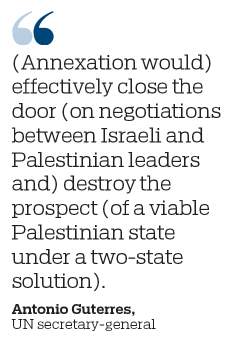Israel, UAE to normalize diplomatic ties
Accord marks a major foreign policy achievement for Trump before election

Israel and the United Arab Emirates have agreed to normalize relations in a landmark United States-brokered deal, only the third such accord the Jewish state has struck with an Arab nation, in which it pledged to suspend annexation of Palestinian lands.
The bombshell news was broken by US President Donald Trump, in a tweet hailing a "HUGE breakthrough" and a "Historic Peace Agreement between our two GREAT friends".
He said leaders from both nations would sign the deal at the White House in roughly three weeks.
Establishing diplomatic ties between Israel and Washington's Middle East allies, including the oil-rich Gulf monarchies, has been central to Trump's regional strategy to contain Iran.
Israeli Prime Minister Benjamin Netanyahu said it was a "historic day" and would launch a "new era" for the Arab world and Israel.
The Palestinians strongly rejected the deal, calling it a "betrayal" of their cause, including their claim to Jerusalem as the capital of their future state.
They also announced they were withdrawing their ambassador from the UAE, and demanded an emergency Arab League meeting.
Islamist group Hamas, which runs the coastal Gaza Strip, quickly said the agreement "does not serve the Palestinian cause".
On Friday, Iran and Turkey also lashed out at the UAE over its decision to normalize diplomatic ties with Israel, accusing it of betraying the Palestinian cause.
Iran's Foreign Ministry called the deal a "dagger that was unjustly struck by the UAE in the backs of the Palestinian people and all Muslims". Turkey said the peoples of the region "will never forget and will never forgive this hypocritical behavior" by the UAE.
A joint statement by Trump, Netanyahu and the UAE's leader, Abu Dhabi's Crown Prince Sheikh Mohamed bin Zayed Al-Nahyan, announced that they had "agreed to the full normalization of relations between Israel and the United Arab Emirates".
It added that Israel would "suspend declaring sovereignty" over occupied Palestinian West Bank areas-an idea proposed in Trump's controversial earlier plan to resolve the conflict.
Sheikh Mohamed said in a tweet that the agreement "was reached to stop further Israeli annexation of Palestinian territories".
But Netanyahu said shortly afterward in a televised address that he had only agreed to delay, not cancel, the annexations, that the plans remained "on the table" and that he would "never give up our rights to our land".
The controversial Trump plan, unveiled in January, had offered a path for Israel to annex territory and Jewish West Bank settlements, communities considered illegal under international law.
The Palestinians rejected it outright as biased and untenable, as did Israel's Arab neighbors, and it sparked fears of further escalation.
Middle East peace
United Nations Secretary-General Antonio Guterres said on Thursday he hoped the deal could help realize a two-state solution with the Palestinians for peace in the Middle East. Annexation would "effectively close the door" on negotiations between Israeli and Palestinian leaders and "destroy the prospect" of a viable Palestinian state under a two-state solution, he said.
Israel has had difficult relations and several wars with its Muslim and Arab neighbors since its founding in 1948, with most states ruling out relations until the Israeli-Palestinian dispute is resolved.
Thursday's deal would make the UAE only the third Arab country to establish formal diplomatic ties with Israel, after its peace deals with former enemies Egypt and Jordan.
President Abdel Fattah al-Sisi of Egypt, which signed a treaty with Israel in 1979 to opposition from across the Arab world, praised the deal on "the halt of Israel's annexation of Palestinian land", and said he hoped it would bring "peace".
The deal marks a major foreign policy achievement for Trump as he heads into a difficult campaign for reelection in November.
His presumptive Democratic challenger for the presidency, Joe Biden, welcomed the agreement and called the UAE's move a "badly needed act of statesmanship".
Hours after the deal was announced, the Emirati flag was projected onto Tel Aviv's town hall.
Agencies, Xinhua and Hong Xiao at the United Nations contributed to this story.
Today's Top News
- China's industrial profits down 1.8% in H1
- Thailand responds to Trump's ceasefire call
- Recall vote shows DPP's manipulation runs against Taiwan people's will: mainland spokesperson
- Top DPRK leader visits China-DPRK Friendship Tower
- China proposes global cooperation body on AI
- Scholars propose inclusive human rights framework






























